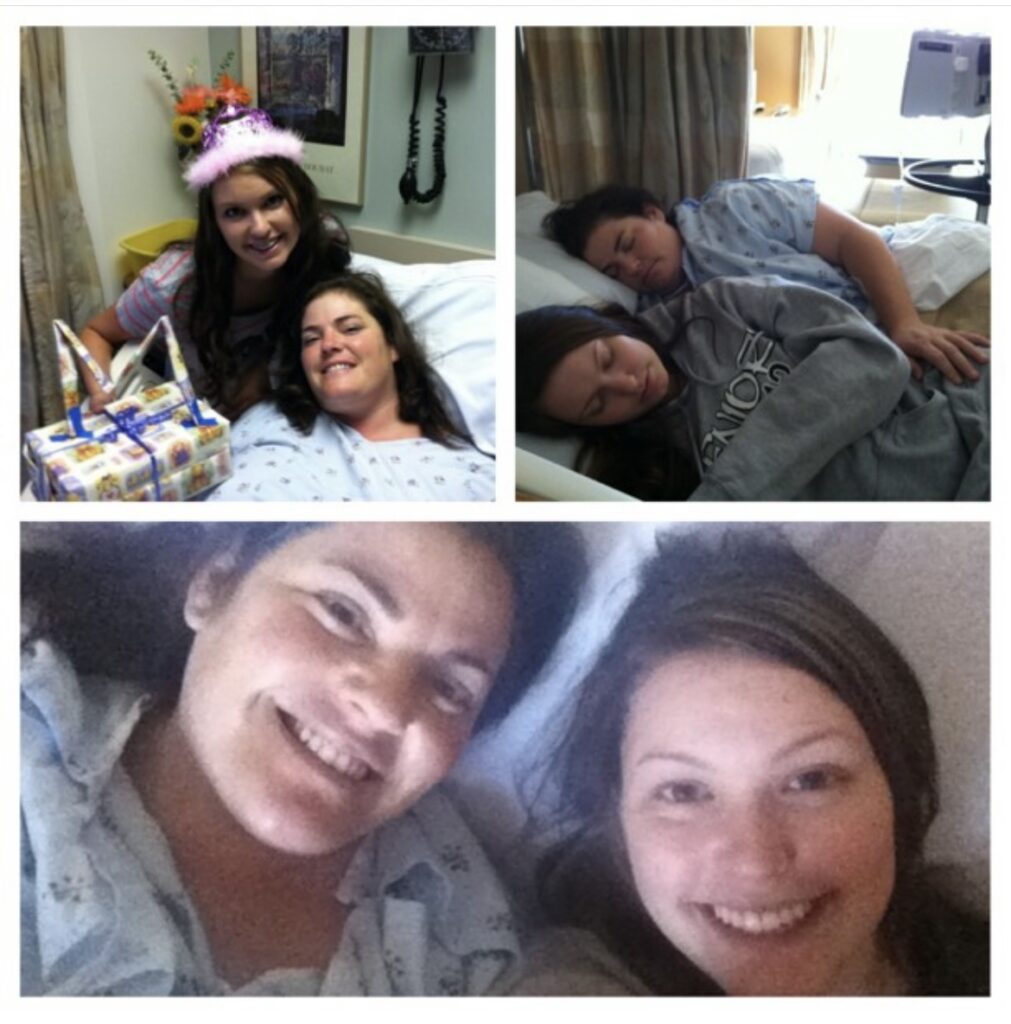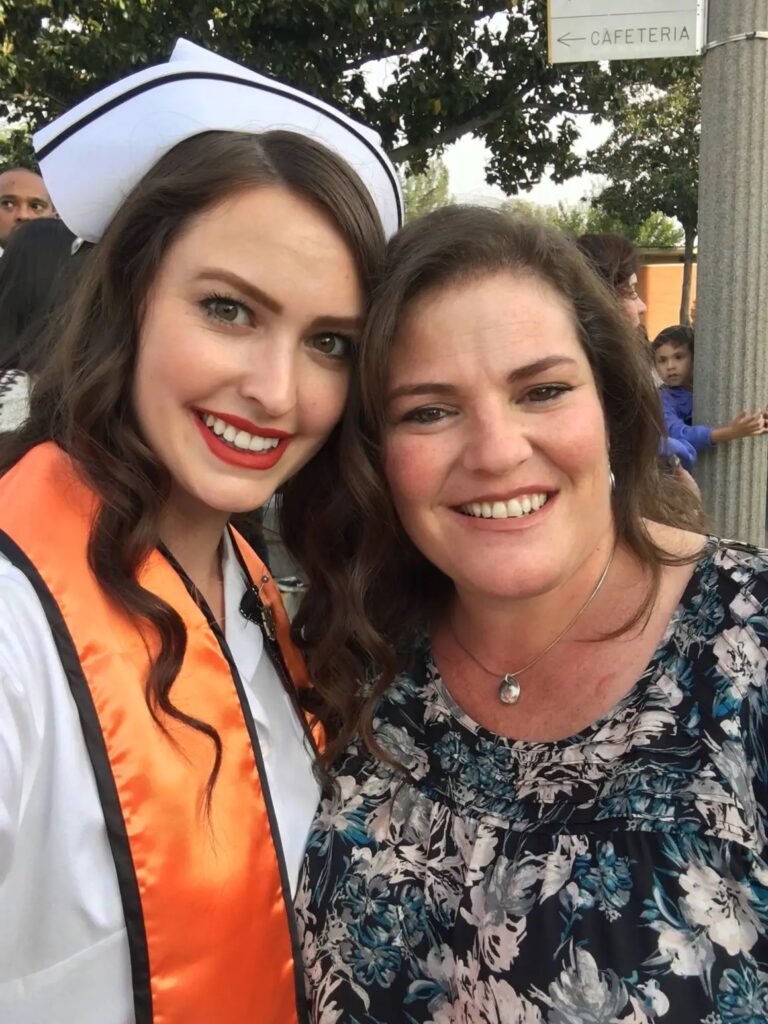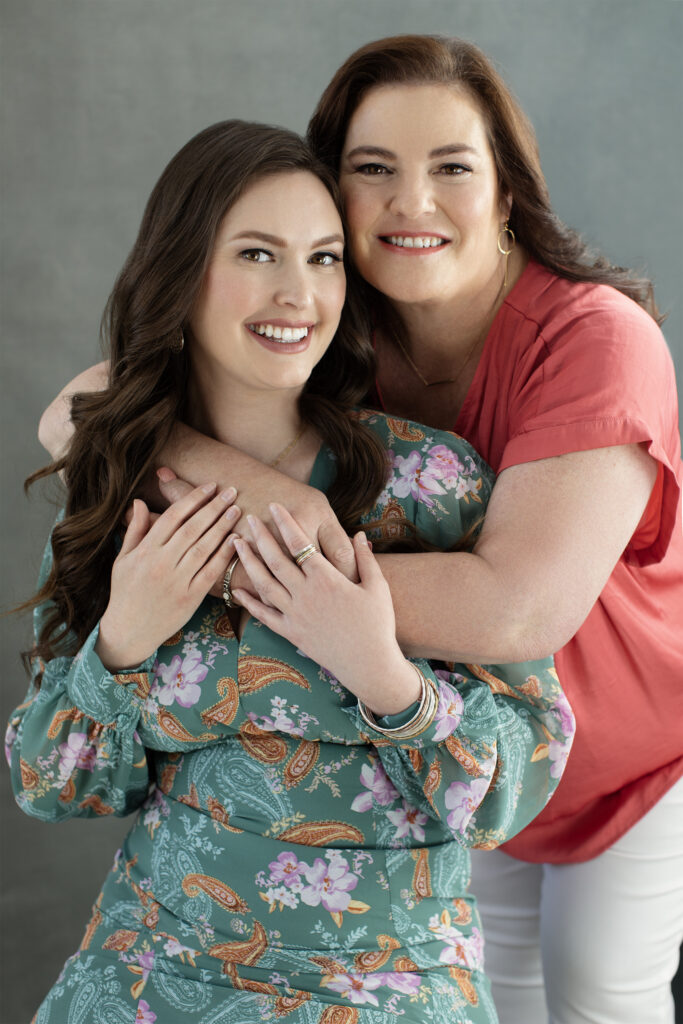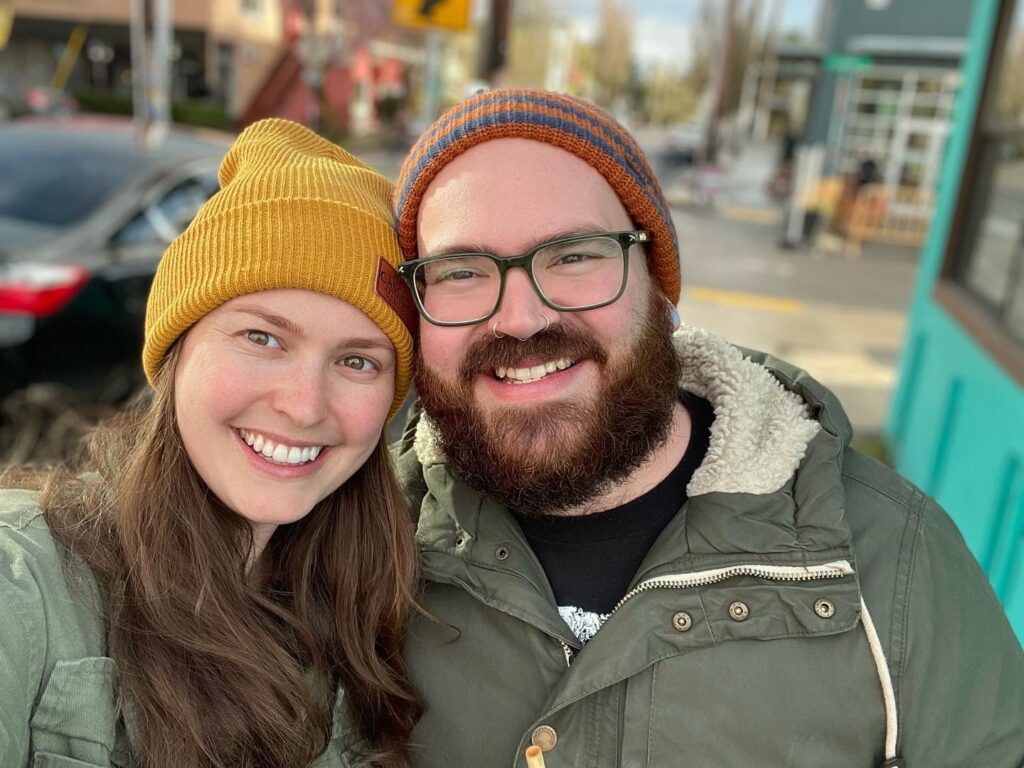Not many Mother’s Day stories revolve around cancer, but for Kenzie Pinck and her mom Shannon, the battle against cancer is a through-line that bonds mother and daughter.
During Kenzie’s early teens, she spent weeks at her mom’s side caring for her after surgery and chemotherapy for treatments related to follicular lymphoma, a type of blood cancer. The experience changed them both, bringing them even closer than they already were.
“I spent my 16th birthday in a tiara in the waiting room while my mom had surgery,” Kenzie said.

This Time It’s Different
Caring for her mom during that time, being her advocate, and connecting with other patients at the hospital helped nudge Kenzie toward medicine. Now a decade later, she’s a nurse in a neonatal intensive care unit. But the experience also taught both women how important it is to educate yourself about your health risks, to be proactive about your well-being, and to advocate for yourself to ensure you get the care you need.
Seven years ago, Shannon’s cancer went into remission. She and Kenzie felt the relief of dodging a bullet and a new appreciation for what is important in this life.
But now, mother and daughter are again facing the threat of cancer. This time, however, it’s different.
“This is something I can tackle,” Kenzie said.
A Founder Variant
Last year Kenzie learned from her 23andMe BRCA1/BRCA2 (Selected Variants) Genetic Health Risk Report* that she had a BRCA1 variant that put her at a much higher risk for breast and ovarian cancer.
Although there are more than 1,000 BRCA variants known to increase cancer risk, the report only looks at three variants. The three so-called ‘founder variants’ are much more common among people of Ashkenazi Jewish descent.
Whereas one in 200-400 people in the general population carries a BRCA variant, about one in 40 people of Ashkenazi descent has one of the three variants included in 23andMe’s report. Women with one of these variants have a 45-85 percent chance of developing breast cancer and up to a 46 percent chance of developing ovarian cancer by age 70.
Men with a BRCA variant have an increased risk for male breast cancer and may have an increased risk for prostate cancer. The risk for certain other cancers may also be higher. (Here’s more about BRCA.)
While Kenzie and Shannon knew they had Jewish ancestry, they weren’t aware of the role ancestry plays in the risk for some health conditions. Because they didn’t have a family history of breast cancer, or at least not that they knew, they never suspected that they might have one of the variants that carry a risk. None of their doctors suggested screening.
“I would have never been tested for it earlier,” said Kenzie, adding that if not for 23andMe, she and her mom might never have known that they carried this risk until it was too late.
Kenzie’s first call after seeing her report was to her mom. She wanted to know if Shannon knew about the variants in the BRCA gene that some people carry that put them at a higher risk for cancer.
“I asked her if she’d heard about it and if she or anyone in our family had tested before, and she said no.”

IF THAT’S WHAT I HAVE TO DO
Their experience is surprisingly common. In a study published in Scientific Reports, 23andMe researchers found that many people with a BRCA variant are likely slipping through the cracks under current testing criteria. Another study by researchers at Geisinger reported that more than 80 percent of people with a BRCA variant did not know they had one.
Shannon and Kenzie said 23andMe’s report and the tutorial part of that report spurred them into action. Because of her cancer history, Shannon made an appointment with her oncologist, where she shared the news about Kenzie’s report. She was referred to a genetic counselor, who immediately set Shannon up for genetic testing. In addition, the genetic counselor suggested Kenzie immediately talk to her doctor to get follow-up testing.
So, Kenzie shared her results with her primary care physician.
“That conversation didn’t go well,” Kenzie said.
In her and her mom’s journey, that was the only encounter with a healthcare professional that went poorly. Even with all the knowledge she has as a nurse and her experience with her mom’s cancer, like many people, Kenzie said navigating her own healthcare isn’t easy. She was looking for insights and advice from her doctor but got something else.
“I prefer that people don’t know these results,” he told her. “I don’t know why you tested yourself.”
Kenzie said her jaw dropped when he said: “What are you going to do, cut off your breasts at 27?”
“I said, ‘Maybe, if that’s what I have to do.'”

Advocating for Yourself
That encounter with her doctor was shocking. His reaction felt like it was from a different era, but it was also a clarifying moment for Kenzie.
“I know how to stand up to a doctor and advocate for myself,” she said. “It scares me for all of the people who don’t know how to do that. Even with my knowledge and background, it was difficult for me, and I think about all the women who don’t know how to protect themselves.”
For Kenzie, this is information about a risk that she could do something about. So why wouldn’t she want to know?
Her doctor begrudgingly referred her to an oncologist. That interaction couldn’t have been more different. The oncologist asked her about her health history, lifestyle, and family’s health history.
“My doctor never asked me any of those questions,” Kenzie said.
All that information factors into her risk. For Kenzie, it reminded her of everything she controls and all the avenues she had to potentially lessen her odds of developing cancer. Almost immediately, she stopped drinking even though she never drank much alcohol. She focused on improving her diet, eating more vegetables and fruit and buying organic. She’s exercising more, and focusing more on reducing stress in her life. After talking to her doctor she also stopped using hormonal birth control because it’s been shown to increase the risk for breast cancer in some women.
A CASCADE
While she was doing that, Kenzie also got confirmatory testing done. She indeed had the variant in BRCA1 that put her at higher risk. Meanwhile, her mom’s testing also came back positive. So both mother and daughter carry the variant in the BRCA1 gene that puts them at higher risk.
While they navigated more tests and decisions on what to do next, both women realized this information was vital to share with the rest of their family. They’d already talked to Kenzie’s older brother, Alex, about it. Men can also carry this risk variant, and the associated increased risk for some cancers. And they, in turn, can pass it on to their children. It turns out Alex also carries the variant. He is following up with his primary care doctor, but said he’s more worried about his mom and his sister.
In addition, Shannon talked to other close family members.
“Almost everyone tested positive,” Shannon said.
They’re each taking action to mitigate their risk.
In genetics, these kinds of family conversations are sometimes called the “cascade effect” of testing. It refers to the positive cascade of events triggered within families after someone learns of an inherited risk like this.
Several years ago, 23andMe researchers did a small study on how people responded to learning of an unexpected genetic health risk for cancer via their 23andMe report. That study found that those who learned they carried a BRCA risk variant usually took appropriate actions. Like Shannon and Kenzie, they talked to their doctors and shared their results with family members. The study showed that the result created a “cascade effect” that benefited relatives who might not know of the family risk for these hereditary cancers.
“It was important to share that information,” said Shannon.

Ticking time bombs
While both Shannon and Kenzie carry the same variant that puts them at risk, they are also at different stages of their lives, so their choices are different.
Kenzie isn’t yet 30, doesn’t have children, and is single. So for her, doing more frequent tests and scans makes more sense. In her head, the age 35 is a marker. It gives her more time to decide if she wants to have children, whether and when to get a mastectomy, or whether to remove her fallopian tubes and both of her ovaries.
The choices for her mom, who is in her 50s and has already had her children, are hard but more straightforward. She’d already gone through cancer once before; she didn’t want to again. In addition, because her cancer is in remission it could always come back. Her nightmare would have been to battle two different cancers at the same time.
Although she had a hysterectomy during her previous cancer surgeries, her ovaries were not removed at the time. Shannon decided to have her ovaries removed after seeing her oncologist. He told her that the ovaries “had to go. They’re like ticking time bombs.”
She recently had surgery to remove them, and is scheduled for her mastectomy after Mother’s Day.
If That’s What I Have to Do
Shannon believes Kenzie saved her life.
This whole experience has altered both Kenzie and Shannon’s perspectives. Shannon said she recently decided that she wouldn’t undergo breast reconstruction surgery after her mastectomy; that seemed so much less important to her now.
For her daughter, who always assumed she’d one day have children, the idea that she might not didn’t feel like such a radical one anymore. But she has time to decide.
For both women, their experience is a testament that knowledge is power.
“I think for me, how quickly we were able to move through this process to take control, that’s powerful,” said Shannon. “When I feel a little deflated or sad that Kenzie has this (risk), I worry about her; Kenzie reminds me of how blessed we are to have this knowledge. Look at what we’ve been able to do, not to get breast cancer. It’s an inspiration.”
Note
*The 23andMe PGS test uses qualitative genotyping to detect select clinically relevant variants in the genomic DNA of adults from saliva for the purpose of reporting and interpreting genetic health risks and reporting carrier status. It is not intended to diagnose any disease. Your ethnicity may affect the relevance of each report and how your genetic health risk results are interpreted. Each genetic health risk report describes if a person has variants associated with a higher risk of developing a disease, but does not describe a person’s overall risk of developing the disease.
The test is not intended to tell you anything about your current state of health, or to be used to make medical decisions, including whether or not you should take a medication, how much of a medication you should take, or determine any treatment. Our carrier status reports can be used to determine carrier status, but cannot determine if you have two copies of any genetic variant. These carrier reports are not intended to tell you anything about your risk for developing a disease in the future, the health of your fetus, or your newborn child’s risk of developing a particular disease later in life. For certain conditions, we provide a single report that includes information on both carrier status and genetic health risk.
Warnings & Limitations
The 23andMe PGS Genetic Health Risk Report for BRCA1/BRCA2 (Selected Variants) is indicated for reporting of the 185delAG and 5382insC variants in the BRCA1 gene and the 6174delT variant in the BRCA2 gene. The report describes if a woman is at increased risk of developing breast and ovarian cancer, and if a man is at increased risk of developing breast cancer or may be at increased risk of developing prostate cancer. The three variants included in this report are most common in people of Ashkenazi Jewish descent and do not represent the majority of BRCA1/BRCA2 variants in the general population.
This report does not include variants in other genes linked to hereditary cancers and the absence of variants included in this report does not rule out the presence of other genetic variants that may impact cancer risk. The PGS test is not a substitute for visits to a healthcare professional for recommended screenings or appropriate follow-up. Results should be confirmed in a clinical setting before taking any medical action. For important information and limitations regarding other genetic health risk reports and carrier status reports, visit www.23andme.com/test-info.




